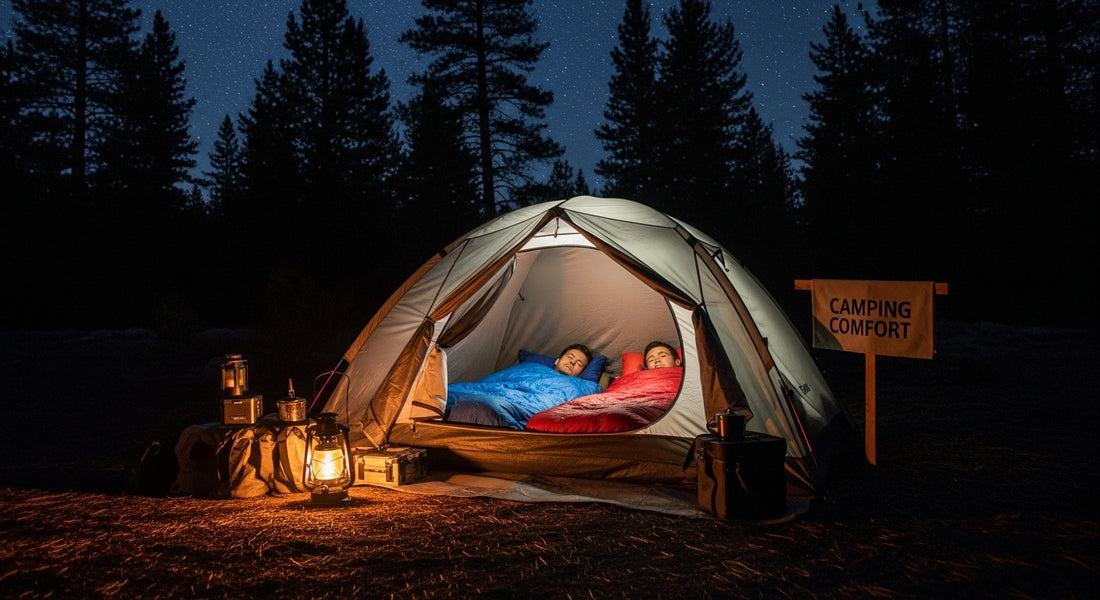Most campers expect that a night in the wild is just about toughing out a little discomfort, but restful sleep outdoors is vital for more than just feeling refreshed. Research shows that poor sleep can cut your physical performance by as much as 20 percent when camping. You might assume sleep just means shutting your eyes until sunrise, but how you rest actually determines your strength, mental sharpness, and even your safety on the trail.
Table of Contents
- What Is Sleep And Its Importance For Campers?
- Why Quality Sleep Matters In The Great Outdoors
- How Sleep Affects Camping Experience And Performance
- Key Factors Influencing Sleep While Camping
- Strategies For Enhancing Sleep Quality On Camping Trips
Quick Summary
| Takeaway | Explanation |
|---|---|
| Prioritize Quality Sleep | Quality sleep enhances physical recovery and cognitive performance during camping. |
| Adapt to Environmental Factors | Understand environmental impacts like temperature and noise that disrupt sleep quality. |
| Optimize Sleep Environment | Create a comfortable sleeping area using proper insulation and gear for restful nights. |
| Manage Light Exposure | Control natural light and electronic device usage to maintain circadian rhythms while camping. |
| Implement Sleep Strategies | Use proactive planning techniques to improve overall sleep during outdoor adventures. |
What is Sleep and Its Importance for Campers?
Sleep represents a critical biological process that restores human physical and mental capabilities, especially crucial for outdoor enthusiasts and campers facing unique environmental challenges. Sleep research from the National Sleep Foundation reveals that quality rest is fundamental for maintaining optimal performance and well-being during camping adventures.
The Physiological Foundations of Sleep
For campers, understanding sleep goes beyond simply closing their eyes and resting. Sleep is a complex neurological process involving multiple stages of brain activity and bodily restoration. During sleep, the human body undergoes critical regenerative processes that repair muscle tissue, consolidate memory, and regulate hormonal systems. Outdoor enthusiasts experience unique sleep challenges due to variable environmental conditions like temperature fluctuations, unfamiliar terrains, and potential physical exhaustion from hiking or other activities.
Why Sleep Matters in Outdoor Environments
In camping scenarios, sleep quality directly impacts physical performance and mental resilience. Proper rest helps campers:
- Recover from physical exertion and muscle strain
- Maintain cognitive alertness for navigation and decision making
- Regulate body temperature and metabolic functions
- Support immune system responses
Understanding the role of sleep in camping becomes essential for creating comfortable outdoor experiences. Check out our guide on camping comfort hacks to enhance your outdoor sleeping strategy and maximize your rest in wilderness settings.
Why Quality Sleep Matters in the Great Outdoors
Camping environments present unique challenges to achieving restful sleep, making understanding sleep quality critically important for outdoor enthusiasts. Research from the American Academy of Sleep Medicine demonstrates that environmental factors significantly impact sleep performance and overall outdoor experience.
Physical Recovery and Performance
Quality sleep serves as a fundamental mechanism for physical restoration during camping trips. After intensive outdoor activities like hiking, climbing, or extended walking, muscles require proper rest to repair microtears and rebuild strength. The body releases critical growth hormones during deep sleep stages, facilitating faster muscle recovery and reducing potential injury risks.
Campers who prioritize sleep quality experience improved physical endurance, faster healing processes, and more consistent energy levels throughout their outdoor adventures.
Psychological Resilience and Mental Alertness
Beyond physical recovery, sleep plays a crucial role in maintaining psychological resilience in challenging outdoor environments. Adequate rest helps campers:
- Maintain sharp cognitive functions for navigation and decision making
- Regulate emotional responses to unexpected situations
- Reduce stress and anxiety associated with unfamiliar wilderness settings
- Support mental clarity and problem solving skills
Psychological preparedness becomes paramount when facing unpredictable outdoor scenarios, making sleep an essential component of wilderness survival and enjoyment.
The table below compares the roles of quality sleep in physical recovery versus psychological resilience during camping, highlighting how each aspect contributes to a better outdoor experience.
| Aspect | Role of Sleep | Outdoor Benefit |
|---|---|---|
| Physical Recovery | Repairs muscles, releases growth hormones, reduces injuries | Improved strength, faster healing, more energy |
| Psychological Resilience | Maintains cognitive function, regulates emotions, reduces stress | Enhanced safety, mental clarity, better mood |
| Learn more about optimizing your camp bedding to enhance your sleep quality and overall camping experience. |
How Sleep Affects Camping Experience and Performance
Research from the National Institutes of Health reveals that sleep profoundly impacts outdoor performance, transforming camping experiences from potentially challenging to genuinely enjoyable. The intricate relationship between sleep quality and outdoor activities creates a complex interplay of physiological and psychological responses that can make or break an adventure.
Sleep Quality and Physical Endurance
In camping environments, sleep directly influences physical capabilities and stamina. Proper rest enables muscle recovery, regulates energy metabolism, and supports the body’s ability to withstand challenging outdoor conditions. Campers who consistently achieve quality sleep experience improved strength, reduced fatigue, and enhanced cardiovascular performance. The body uses sleep as a critical recovery mechanism, repairing tissue damage, rebuilding muscle fibers, and replenishing energy stores essential for sustained outdoor activities.
Cognitive Function and Decision Making in Wilderness Settings
Beyond physical performance, sleep critically affects mental acuity and decision making during camping trips. Insufficient or disrupted sleep can lead to:
- Reduced reaction times
- Impaired judgment in potentially dangerous situations
- Decreased problem solving capabilities
- Higher risk of making critical errors during navigation
Mental sharpness becomes paramount in wilderness environments where quick thinking and adaptability can mean the difference between a safe journey and a potentially risky situation. Explore car camping advantages to understand how strategic sleeping arrangements can enhance your outdoor experience and overall safety.
Key Factors Influencing Sleep While Camping
Scientific research from the Sleep Research Society highlights that camping sleep experiences are fundamentally different from home environments, with multiple complex factors determining rest quality. Understanding these variables becomes crucial for outdoor enthusiasts seeking comfortable and restorative sleep during their adventures.
Environmental Challenges and Sleep Disruption
Camping environments present unique sleep disruption challenges that significantly impact rest quality. Temperature fluctuations, ambient noise from wildlife, uneven terrain, and varying light conditions can dramatically alter sleep patterns. Outdoor sleepers must contend with natural temperature drops during nighttime, unexpected sounds like rustling leaves or distant animal calls, and the absence of consistent light control that typically exists in indoor settings.
Below is a table summarizing the major environmental and physiological factors that can disrupt sleep while camping and the specific effects they have on outdoor rest quality.
| Factor | Description | Typical Impact |
|---|---|---|
| Temperature Fluctuations | Variability in nighttime temperatures outdoors | Sleep disturbance, chills |
| Ambient Noise | Sounds from wildlife or the environment | Sleep fragmentation |
| Uneven Terrain | Rough, sloped, or rocky ground surface | Discomfort, poor sleep posture |
| Light Conditions | Inconsistent natural or artificial light exposure | Circadian rhythm disruption |
| Awareness of Surroundings | Heightened alertness to new stimuli | Difficulty falling/staying asleep |
| Hormonal Shifts | Changes in melatonin and cortisol due to new environment | Trouble maintaining restful sleep |
 These environmental variables trigger physiological stress responses that can fragment sleep and reduce overall rest efficiency.
These environmental variables trigger physiological stress responses that can fragment sleep and reduce overall rest efficiency.
Physiological and Psychological Sleep Adaptation
Adapting to outdoor sleeping requires understanding how the human body responds to novel environments. Campers experience complex neurological and hormonal shifts when sleeping outside traditional comfort zones. Key adaptations include:
- Heightened awareness of surrounding environmental stimuli
- Modified melatonin production due to natural light exposure
- Increased sensitivity to temperature changes
- Potential elevation of stress hormones like cortisol
Successful wilderness sleep depends on recognizing and mitigating these physiological challenges. Learn about memory foam solutions for outdoor comfort to enhance your camping sleep experience and minimize environmental disruptions.
Strategies for Enhancing Sleep Quality on Camping Trips
Research on sleep interventions in field environments demonstrates that proactive planning and strategic approaches can significantly improve rest during outdoor adventures. Campers who understand and implement targeted sleep enhancement techniques can transform potentially challenging nights into restorative experiences.
Physical Comfort and Sleep Environment Optimization
Creating an optimal sleep environment represents the foundation of quality outdoor rest. Campers must carefully consider factors like ground insulation, protection from environmental elements, and temperature regulation. Selecting appropriate sleeping gear that provides consistent thermal comfort becomes crucial. This includes choosing sleeping bags rated for specific temperature ranges, using insulating sleeping pads, and selecting clothing layers that maintain body heat without causing excessive sweating. The goal is to minimize external disruptions and create a consistent microclimate that supports uninterrupted sleep.

Circadian Rhythm and Natural Light Management
Managing exposure to natural light and maintaining consistent sleep patterns plays a critical role in outdoor sleep quality. Campers can optimize their circadian rhythms by:
- Minimizing blue light exposure from electronic devices after sunset
- Aligning sleep schedules with natural daylight cycles
- Using eye masks to control light sensitivity
- Practicing consistent sleep and wake times
Understanding these biological mechanisms helps outdoor enthusiasts leverage natural sleep processes and improve overall rest quality. Explore our camp bedding organization guide to further enhance your camping sleep strategy and create a more comfortable outdoor sleeping experience.
Upgrade Your Camping Comfort with Hazli Collection
Are you tired of restless nights outdoors due to thin sleeping pads and unpredictable weather? The article ‘Understanding the Role of Sleep in Camping Comfort’ highlights how sleep quality shapes every camping experience. Common pain points like muscle soreness, disrupted sleep cycles, and inadequate support from standard gear can leave you drained rather than rejuvenated. Improved outdoor rest starts with solutions designed to meet these real challenges.

Transform your next trip by choosing gear that delivers comfort and restorative rest. Discover our selection of high-quality memory foam mattresses and outdoor sleep solutions at Hazli Collection that help you achieve deeper, uninterrupted sleep even in challenging conditions. For tips on selecting the right bedding setup, explore our camp bedding organization guide. Do not let poor sleep hold your adventures back. Visit Hazli Collection now and take the first step toward better rest and more enjoyable days outdoors.
Frequently Asked Questions
How does sleep impact physical performance while camping?
Quality sleep is essential for physical recovery during camping trips. It facilitates muscle repair, reduces fatigue, and improves endurance, allowing campers to perform optimally during outdoor activities.
What strategies can I use to enhance my sleep quality while camping?
To improve sleep quality, consider optimizing your sleep environment by using adequate insulation, selecting appropriate sleeping gear, and managing exposure to natural light. This will help create a comfortable microclimate that supports restful sleep.
Why is psychological resilience important during camping?
Psychological resilience is vital for outdoor enthusiasts as it helps maintain sharp cognitive functions, regulate emotions, and effectively manage unexpected situations, which is essential for safety and enjoyment in the wilderness.
What environmental factors can disrupt sleep while camping?
Environmental factors such as temperature fluctuations, ambient noise from wildlife, uneven terrain, and varying light conditions can significantly impact sleep quality, making it essential to address these challenges for a restful camping experience.

